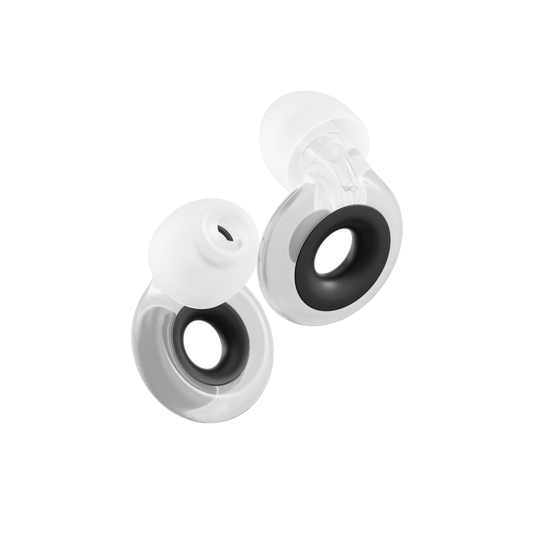Key highlights:
- Sound sensitivity is a heightened reaction to sound – and it can have a huge impact on your daily life and emotional wellbeing
- It's important to develop coping strategies to help you better deal with triggering sounds, meaning you’re less likely to isolate yourself from the outside world – and more likely to live your best life
- From wearing noise-reducing earplugs in noisy environments to practicing deep breathing exercises, here are our top five ways to deal with noise sensitivity
Sound sensitivity comes in many guises – but all involve a heightened reaction to sound, and all can have a big impact on your life. If you suffer from noise sensitivity, it’s important to develop coping strategies to reduce distressing symptoms and improve your quality of life. From wearing Loop Earplugs to building relaxation techniques into your day, these tips and tricks will help to provide relief from sound sensitivity and ensure you can live life on your own terms.
Understanding sound sensitivity
Overwhelmed by noises to the point where it stops you from doing things or going out? Do certain sounds trigger anxiety or panic? Or perhaps you find they make it difficult to focus on conversations? You’re not alone, and we feel you.
There are many conditions that cause sensitive hearing. It helps to give the problem a name.
Maybe you suffer from misophonia and have a strong reaction to specific sounds, like chewing or yawning. This can cause a strong emotional response like irritation, rage or panic.
Or perhaps you find many noises painfully loud, the hallmark of hyperacusis. Then you might feel completely overwhelmed by the sound of lawnmowers or ambulances.
Hyperacusis often goes hand in hand with other conditions such as post-traumatic stress disorder (PTSD). If you are a highly sensitive person (HSP), have ADHD, sensory processing disorder or autism or are suffering from a concussion you could also have a heightened sensitivity to sound. Behavioral experts can give you strategies to cope with this sensitivity, some of which overlap with strategies for other sound perception disorders like tinnitus.
Can’t define your relationship with noise sensitivity? Let’s call it “complicated” then! It could be an idea to make a list of auditory issues that disturb your daily life. Simply something to hold on to so you get to know yourself a little better.
If you’re sensitive to noise, you may find it challenging to deal with – both at home and when you’re out and about. After all, there are loud noises everywhere. That’s why it’s so important to develop coping strategies for sound sensitivity anxiety, to help improve your wellbeing and ensure you can live life to the fullest.
Coping strategies for sound sensitivity


If you’re wondering how to cope with noise anxiety, then look no further. From creating a quieter environment to relaxation techniques, these strategies are all tried-and-tested methods of managing sound sensitivity.
10M+ happy customers
Featured collection
1. Noise reduction techniques


Creating a quiet, peaceful environment is really important if you have sound sensitivity. There are enough noises out there in the world, so it can be helpful to have a safe place with minimal sound triggers at home, to minimize discomfort and stress.
You could use soundproofing materials in your home or in your bedroom, like thick curtains and rugs. Sometimes just closing windows and doors can be enough to reduce external noises, while white noise machines are a great way to mask disruptive noises, thanks to their consistent, soothing sound.
If you’re overstimulated by noise, taking measures to reduce sound triggers in your home can give you a greater sense of control over your own environment. It also means you have a quiet place for relaxation, meaning you’re less likely to isolate yourself from the outside world, knowing you have a safe, quiet space to come home to.
2. Incorporate mindfulness and relaxation techniques
Mindfulness and relaxation techniques can be crucial in helping you to deal with noise sensitivity, as they can help you to feel calmer, reduce stress, and get you into a more positive state of mind – meaning you’re better able to manage your reactions to sounds.
Breathing exercises and yoga can help lower our stress levels and make us feel more zen. They help you learn to breathe in and out slowly and calmly, slowing down your heart rate and quieting restless thoughts. You can find a ton of these exercises online, but we’ve outlined a couple of our favorites below.
Box breathing exercise
- Close your eyes and take a few deep breaths to center yourself
- Inhale deeply through your nose for a count of four
- Hold your breath for a count of four
- Exhale slowly through your mouth for a count of four
- Hold your breath for a count of four
- Repeat these steps 3-5 times
Child’s pose
- Sit in a kneeling position, with your bottom on your heels
- You can keep your knees close together or spread them wide apart
- Lean forward, keeping your buttocks on your heels as you bring your forehead down towards the floor
- Stretch your arms out in front of you, or bring your arms alongside your legs depending on your preference
- Breathe deeply
- Stay in this position for as long as you need, until you feel calmer and more centered
Practice doing these exercises at home: first in silence, then slowly building up the sound level to ramp up your ability to cope with noise triggers in the moment.
3. Build up a stress toolkit
Anxiety, irritation and stress are going to kick your noise sensitivity into high gear. So anything you can do to address your overall stress level is going to help with your sensitivity to sound as well. Since we can’t get rid of everything that stresses us out, we have to start with ourselves.
Breathing exercises can help lower our stress levels and make us feel more zen. They help you learn to breathe in and out slowly and calmly, slowing down your heart rate and quieting restless thoughts. You can find a ton of these exercises online. Practice doing them at home: first in silence, then slowly building up the sound level to ramp up your ability to cope with noise triggers in the moment.
There are lots of other strategies to help counteract noise overwhelm. One is to focus your attention on something else, like playing with a ring or bracelet. Another is pleasant tastes or smells: sucking on a peppermint, or smelling a handkerchief with a pleasant smell.
Others rely on cognitive behavior therapy techniques (CBT), which recognizes emotions while providing tools to manage negative thoughts. Try a few things and see what works for you!
4. Don’t overprotect your ears

One thing is clear: the more you protect your hearing, the more sounds can keep causing anxiety.
Fear of loud or triggering sounds causes people to isolate and can actually increase the likelihood of being triggered by them. This can keep them in a state of being overly sensitive and unable to cope.
The good news is that you can help reduce noise without shutting out the world.
Ear defenders and traditional earplugs can be helpful in some situations, when mowing the lawn for example. But relying on them all the time will make your ears even more sensitive to loud sounds and noises.The best thing is to reduce the noise without isolating yourself. By lowering the volume of sounds without eliminating them completely, you can avoid triggering your fight or flight response. That means you’re less likely to feel overwhelmed or triggered by noise, and more likely to stay healthy and happy.
5. Loop Earplugs - A reliable solution
We have a choice of earplugs here at Loop, to reduce the noise to levels that are more manageable for you. Loop Quiet earplugs reduce noise levels by up to 24 decibels (SNR) and 14 decibels (NRR), with a super-soft silicone design for maximum comfort. Whether you’re trying to reduce the amount of noise you hear at night to help you get a better sleep, or need to get into your bubble to focus on studying or work (without the sound of traffic or roadworks outside), Loop Quiet’s got your back.
“Bought them to deal with noisy neighbors. Work perfectly and are really comfortable to sleep in. They hardly fall out during the night too which is a real bonus.”
– Hollie S.
Loop Engage earplugs are also great for helping you to deal with noise sensitivity, especially if you’re in noisy environments where you still need to be sociable. They combine a patented acoustic channel with a newly engineered filter to offer up to 16 dB (SNR) and 10 dB (NRR) of noise reduction, without affecting the clarity of your voice. That means you can take the edge off in loud social situations – while staying fully present and engaged.
“I suffer from misophonia, so am triggered by noises like heavy breathing and loud chewing. These do actually block out those sounds whilst still being able to hold a conversation or watch something on the TV.”
– Dawn
This article has been written by Magali De Reu in 2021 and has been updated by Lauren McKay in 2024.



































